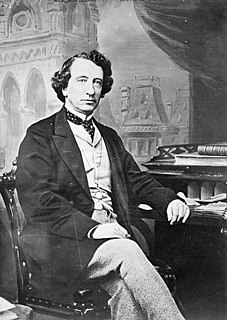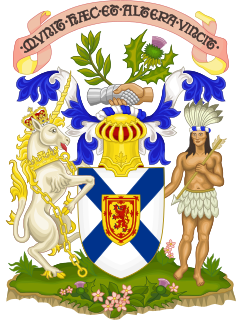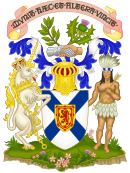
Canadian Confederation was the process by which three British North American provinces, the Province of Canada, Nova Scotia, and New Brunswick, were united into one federation called the Dominion of Canada, on July 1, 1867. Upon Confederation, Canada consisted of four provinces: Ontario and Quebec, which had been split out from the Province of Canada, and the provinces of Nova Scotia and New Brunswick. Over the years since Confederation, Canada has seen numerous territorial changes and expansions, resulting in the current number of ten provinces and three territories.

The 1867 Canadian federal election was held from August 7 to September 20, 1867, and was the first election for the new country of Canada. It was held to elect members representing electoral districts in the provinces of Nova Scotia, New Brunswick, Ontario and Quebec to the House of Commons of the 1st Canadian Parliament. The provinces of Manitoba (1870) and British Columbia (1871) were created during the term of the 1st Parliament of Canada and were not part of this election.
The Nova Scotia New Democratic Party is a progressive, social-democratic provincial party in Nova Scotia, Canada. It is the provincial entity of the federal New Democratic Party (NDP). It was founded as the Co-operative Commonwealth Federation (CCF) in 1932, and became the New Democratic Party in 1961. It became the governing party of Nova Scotia following the 2009 Nova Scotia election, winning 31 seats in the Legislature, under the leadership of Premier Darrell Dexter. It is the first New Democratic Party in Atlantic Canada to form a government. The party lost government at the 2013 election, losing 24 seats, including Dexter's seat. The outgoing leader, Gary Burrill, is credited with bringing the party back to its left-wing roots, after the centrist policies of Dexter. The party currently holds 6 seats in the Legislature.

Anti-Confederation was the name used in what is now the Maritimes by several parties opposed to Canadian Confederation. The Anti-Confederation parties were accordingly opposed by the Confederation Party, that is, the Conservative and Liberal-Conservative parties.

The Nova Scotia Liberal Party is a centrist provincial political party in Nova Scotia, Canada and the provincial section of the Liberal Party of Canada. The party currently forms the Official Opposition in Nova Scotia, under the leadership of Zach Churchill. The party was in power most recently from the 2013 election until the 2021 election.

The Progressive Conservative Association of Nova Scotia, is a moderate political party in Nova Scotia, Canada. Like most conservative parties in Atlantic Canada, it has been historically associated with the Red Tory faction of Canadian conservatism. The party is currently led by Pictou East MLA Tim Houston. The party won a majority government in the 2021 provincial election.

The 2006 Nova Scotia general election was held on June 13, 2006 to elect members of the 60th House of Assembly of the Province of Nova Scotia, Canada.
The timeline of elections in Canada covers all the provincial, territorial and federal elections from when each province was joined Confederation through to the present day. The table below indicates which party won the election. Several provinces held elections before joining Canada, but only their post-Confederation elections are shown. These include:

The 1999 Nova Scotia general election was held on July 27, 1999, to elect members of the 58th House of Assembly of the Province of Nova Scotia, Canada. The government was defeated on a money bill on June 18, and the Nova Scotia House of Assembly was dissolved by Lieutenant Governor James Kinley. It was won by the Progressive Conservative party, led by Dr. John Hamm. They received a majority of 30 seats compared to 11 seats by the NDP and 11 by the Liberals.
Nova Scotia is a parliamentary democracy. Its legislature consists of the Lieutenant Governor of Nova Scotia and fifty-five members representing their electoral districts in the Nova Scotia House of Assembly. As Canada's head of state, Queen Elizabeth II is the head of Nova Scotia's chief executive government. Her duties in Nova Scotia are carried out by the Lieutenant-Governor, Arthur LeBlanc. The government is headed by the Premier, Tim Houston, who took office August 31, 2021. Halifax is home to the House of Assembly and Lieutenant-Governor. The House of Assembly has met in Halifax at Province House since 1819.

The Government of Nova Scotia refers to the provincial government of the Canadian province of Nova Scotia. Nova Scotia is one of Canada's four Atlantic Provinces, and the second-smallest province by area. The capital of the province, Halifax, is Nova Scotia's largest city and its political capital. Halifax is where the Province House, Canada's oldest legislative building, is located.

The 2009 Nova Scotia general election was held on June 9, 2009 to elect members of the 61st House of Assembly of the Province of Nova Scotia, Canada. The government was defeated on a money bill on May 4, and the Nova Scotia House of Assembly was dissolved by Lieutenant Governor Mayann Francis on May 5. thereby triggering an election. The NDP won a majority government, forming government the first time in the province's history, and for the first time in an Atlantic Canadian province. The governing Progressive Conservatives were reduced to third place.

This article is the Electoral history of Sir Charles Tupper, the sixth Prime Minister of Canada. A Conservative, he became prime minister upon the resignation of Prime Minister Sir Mackenzie Bowell over the Manitoba Schools Question in 1896. Tupper was the shortest-serving prime minister, with a term of only 68 days. He led his party in two general elections and lost both, to Sir Wilfrid Laurier











